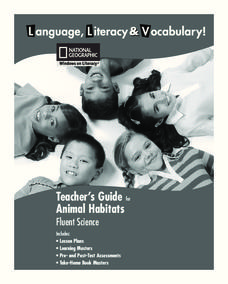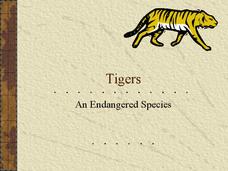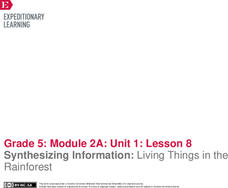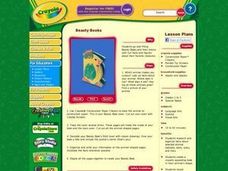National Geographic
Animal Habitats
Explore animal habitats and reinforce speaking, listening, reading comprehension, and writing skills with a unit that focuses on the Arctic, desert, ocean, prairie, and rainforest. Enthusiastic scientists read informational text to...
Curated OER
Bottled Water Ban
Convenience, taste, portability ... what's not to love about bottled water? Apparently, a lot. Scholars analyze the four main arguments supporting and opposing the sale of bottled water. They explore the health, environmental, and...
Sea World
Marine Animal Husbandry and Training
Step into the role of a zoo director with several activities about animal training and running a zoo. Kids calculate the amount of food each animal needs, design a habitat for penguins, decide how to breed bottlenose dolphins, and train...
Curated OER
Tigers: An Endangered Species
Facts about tigers are packed into a PowerPoint presentation about tigers. The presentation includes great photographs and accompanying text regarding the habitats, diet, lifespan, and physical attributes of tigers. Very interesting!
National Wildlife Federation
Penguin Fun Facts
What's black and white and can dive up to 1,800 feet under water? That's right, penguins! Learn this and many other amazing facts about these unique birds with this handy reference sheet.
PreKinders
Insect Picture Word Cards
Creepy crawly insects! Learn the names of 12 different insects, including ladybugs, cicadas, and katydids. Each card features a picture of the insect as well as its name in large letters.
EngageNY
Synthesizing Information: Living Things in the Rainforest
How is a map a type of informational text? Class members view a world map of major rainforests, discussing its text features with a partner. Next, they take notes on key details from multiple texts about rainforests and write an...
American Museum of Natural History
Mammal Flipbooks
Scholars follow eight steps to create a flipbook and discover key facts about mammals' locomotion.
Howard Hughes Medical Institute
Lesson 2: Gorongosa National Park
How has Gorongosa National Park changed over time? Discover the park's rich history, dating back to primitive human times, through an interactive timeline and scientific reading. The second installment in an eight-part series explores...
Curated OER
Ecuadorian Highlands Lesson
Indigenous peoples resided in the highlands of Ecuador as far back as 5,000 B.C. To learn about the lives of these people, class pairs research the farming and the building methods, the arts and crafts, and the beliefs of the early...
Curated OER
What Do We Learn From Fossils?
Students investigate what a fossil is and how it came to be. In this fossil lesson, students examine pictures of skeletons and identify characteristics that can and cannot be determined by a fossil. Students complete diagrams...
Curated OER
Born to be Wild
Students watch an episode depicting the human vs. polar bear conflict in Churchill, Canada. They conduct online research and analyze the information. They interpret the facts and use storytelling techniques and role playing to convey...
Curated OER
Ivory Wars
Middle schoolers examine the controversy surrounding African trade. In this geography activity, students research the killing of elephants for ivory. Middle schoolers collaborate to report on the history of the ivory trade and its...
Curated OER
The Effects of Global Warming in Alaska
Students view video clips and create presentations to illustrate the problems in Alaska related to global warming. In this climate change lesson plan, students view a Quick-Time video about the consequences of global warming in Alaska....
Curated OER
Arctic Food Web
Young scholars research animals found in the arctic. They discuss what living things need in order to survive and where they get their food. Students discuss the difference between producers and consumers and create a food web for...
Curated OER
The Circulatory System
Students explore the circulatory system of animals. Using the Internet, students research animals without circulatory systems. They identify the three types of blood vessels and describe the flow of blood through the heart. Finally,...
Curated OER
Beasty Books
Students, after researching and organizing facts about selected animals habitats, diets, sizes and lives, create a visually appealing book in their animal's shape. They record information assessed from their research in the books.
Curated OER
When is Your Animal Most Active?-- Class Bar Graph
In this science and math instructional activity, a group of learners participate in graphing what time of day their chosen animals are most active. Students fill out the bar graph choosing day or night.
Curated OER
Hey - It's a Rainy Forest Out There!
Elementary schoolers take part in a very good lesson which has them watch video, conduct experiments, complete hands-on activities, and work in cooperative groups. The educationally-rich activities are clearly-explained, and the group...
Georgia Department of Education
Native Americans in Georgia History
Let your learners find out firsthand what hunting and gathering was really like, with a role-play activity they will remember for years. The class researches how indigenous people used plants and animals to survive while respecting...
Staten Island Zoo
The African Savanna
Are you thinking about taking your class to the local zoo? Kids of all ages love visiting exotic animals in order to learn about biodiversity, habitat, and animal adaptations. Here is a 44-page activity guide that provides educators with...
Teach Engineering
Live Like an Animal
When your parents say that your room's a pig sty, tell them about biomimicry. The sixth installment of a nine-part Life Science unit has scholars research the shelters used by animals in the natural world, like turtle shells. Using the...
Curated OER
Exploring Regions of Our World
Examine how climate and landforms affect plants and animals that live in particular areas. Discover that these same factors affect peoples' homes, jobs, and recreational activities. Pupils research ecosystems and biomes, and then write...
Curated OER
Illinois Wild
Sixth graders identify different animals native to Illinois. They research a specific animal to study more about its characteristics, examine what makes a habitat, and recognize the difference between a food web and food chain.
Other popular searches
- Animals Research Projects
- Rain Forest Animals Research
- Rainforest Animals Research
- Abc Animals Research
- Music Animals Research























